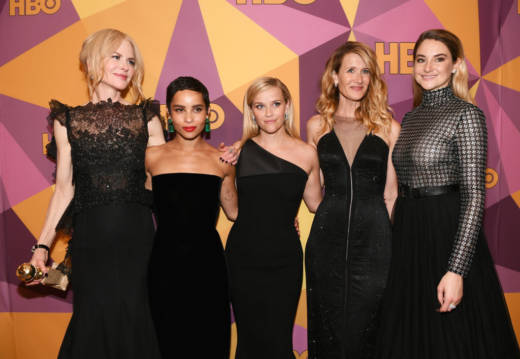But last night, something amazing did happen. It started on the red carpet. NBC's Al Roker seemed taken aback by what he called “a different energy... a real positive energy,” only to have Viola Davis explain: “That’s what purpose does.” Over on E!, Debra Messing was busy calling out the channel for paying female presenters less than their male counterparts.
I watched the full hour of NBC's coverage, and not only was no one asked any of those eye-roll-worthy questions we're so sick of hearing -- "Who are you wearing?" "How long did it take you to get ready?" -- every woman interviewed was given space to talk about industry sexism in a completely unprecedented way.
Notable sound bites from the red carpet included:
Viola Davis: “For me, I’m here because I hear the voices of women who said 'Me Too'. One of them was me. I hear those women… who don’t have a platform.”
Sarah Jessica Parker: “It’s thrilling to be here and watch this roll out. I think it is for all of us to see this robust, enthusiastic stand of solidarity by so many. Not only is the conversation timely… it’s really not controversial. We just have to get the work done.”
Maggie Gyllenhaal: “Everybody’s talking about women… Change is always painful, but I think we’re going to do it.”
Kerry Washington: “We’re committed to making a change not just in our industry, but in every industry… Time is up on the imbalance in society. Time’s up on our silence.”
Eva Longoria: “It’s not a moment, it’s a movement.”
Mariah Carey: “Oftentimes men forget that women write songs, so we’re here for that as well.”
Michelle Williams (standing alongside #MeToo founder, Tarana Burke): “I thought I would have to raise my daughter to learn how to protect herself in a dangerous world and I think because of the work Tarana has done and the work I am learning how to do, we actually have the opportunity to hand our children a different world."
Tarana Burke told NBC she was there to “represent survivors around the world.” She told E!: "This moment is so powerful because we’re seeing a collision of these two worlds… that people don’t usually put together… It’s really powerful to be on the red carpet tonight.”
Once inside, Seth Meyers' opening monologue was appropriately biting. “Good evening, ladies and remaining gentlemen,” he started, before taking swipes at Kevin Spacey, Woody Allen, and Harvey Weinstein, the latter of which he referred to as "the elephant not in the room... Don’t worry. He’ll be back in 20 years, when he'll be the first person to be booed during the In Memoriam segment.” That last comment drew gasps from the crowd, but Meyers was unflappable. “People in this room worked really hard to get here," he concluded, "but it’s clearer than ever before that women had to work even harder.”
Truly, wearing black wasn't merely a symbolic gesture at the 75th Golden Globes -- it set the tone for the entire evening. It was a jumping off point, the uniformity of which gave rise to a new bravery, which in turn led to much more emboldened commentary. In what other year could Natalie Portman have presented Best Director for a Motion Picture with the words: “And here are the all male nominees”?
What's more, female award-winners repeatedly used the podium to let out a rallying cry asking for a long-term commitment to change. Laura Dern (winning Supporting Actress in a limited series for Big Little Lies) said: “Many of us were taught not to tattle. It was a culture of silencing, and that was normalized. I urge all of us to not only support survivors and bystanders who are brave enough to tell their truth, but to promote restorative justice. May we also, please, protect and employ them. May we teach our children that speaking out without the fear of retribution is our culture’s new North Star."
Reese Witherspoon repeated the sentiment: “I want to thank everyone who broke their silence this year. You are so brave… We see you, we hear you, and we will tell your stories.”
Rachel Brosnahan (winner of “Actress in a Comedy or Musical” for Marvelous Mrs. Maisel) said: “There are so many women’s stories out there that need to be told. Let’s continue to hold each other accountable and challenge and make these stories.”
Elizabeth Moss (winner of "Actress in a Drama Series” for The Handmaid’s Tale) dedicated her award to feminist author Margaret Atwood and “all of the women who came before you and after you who were brave enough to… fight for equality. We are the story... and we are writing the story ourselves.”
Barbara Streisand hammered the overdue need for such action home after she was introduced as the only woman to win a Golden Globe for directing. Arriving on stage, she asked: “Did I hear that right? ... You know, that was 1984. That was 34 years ago! Folks! Time’s up! We need more women directors and more women to be nominated for Best Director... I am proud that our industry, faced with uncomfortable truths has vowed to change the way we do business.”
It was Oprah though, winning the Cecil B. DeMille Award, that brought the house down. Her entire speech, about living "too many years in a culture broken by brutally powerful men," summed up the mood and ultimate importance, of the evening:


